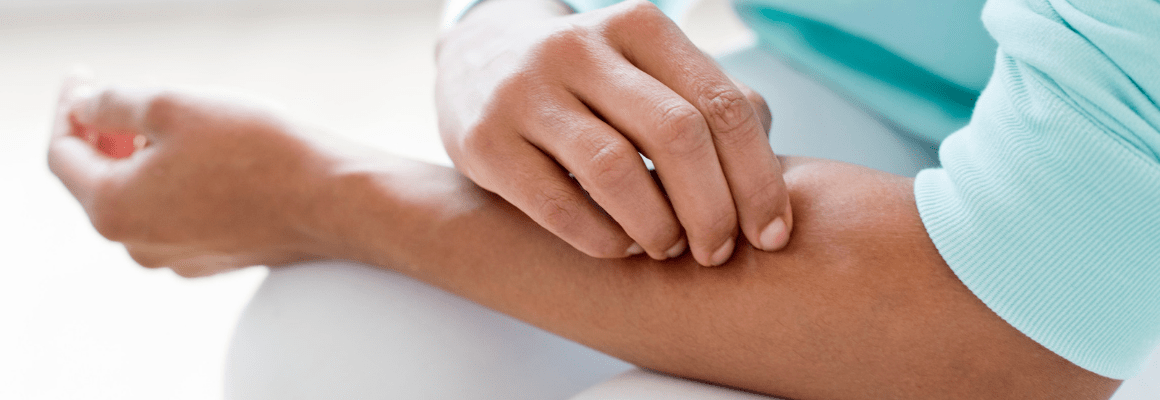Suffering from allergies is never fun. Whether it’s an itchy rash, patches of irritation and redness, hives, or swelling, an allergic reaction is uncomfortable and sometimes even painful. It can even be characterized by small blisters or tiny bumps.
In this post, we’ll go over some possible reasons why your skin is itchy and explore how you can protect your skin from an allergic reaction. Read on to discover the best natural skin treatment for allergies.
Why is my Skin Itchy?
Before we get into allergies, it’s important to determine why you may be suffering from itchy skin in the first place. Apart from allergies, there are a few potential reasons why your skin may be itching.
Many times, itchy skin can be the result of dry skin. If you’re noticing that your skin is itchy but free from red bumps or other physical changes, it’s likely not an allergic reaction.
Dry skin is characterized by rough or scaly skin, intense itchy rashes, and cracks that may bleed. Although dry skin can affect any age group, the condition tends to get worse with age as older people produce less oil. Extreme temperatures, particularly cold weather with low humidity, can also exacerbate dry skin symptoms. In addition, excessive washing can further dry out the skin as water can strip the skin of its natural oils.
Fortunately, dry skin is usually just a temporary problem that can go away with some simple lifestyle changes and the excessive use of moisturizers.
Another potential cause of itchy skin is a skin condition like eczema. Eczema is a common skin condition in which a damaged skin barrier has difficulty retaining moisture. This leads to chronically dry skin which, in turn, results in itchiness.
An inflammatory skin condition, eczema is characterized by red rashes, a burning or stinging sensation, flakiness, scaling, and sometimes even blisters. If excessive scratching causes the skin to crack or bleed, the body becomes more vulnerable to infection.
Eczema symptoms may vary from person to person, as well as in degrees of intensity. You may go through periods of intense flare-ups and others where symptoms are barely noticeable at all. Flare-ups can be affected by external factors such as weather conditions, sweat, stress, an allergic reaction to the foods you eat, and, of course, contact with allergens and irritating substances.
Eczema and Allergies
People who suffer from eczema are already dealing with highly sensitive skin. This is what makes the skin more susceptible to an allergic reaction, especially if it comes into contact with an irritating substance.
For many people, triggering substances can be common household objects that the skin likely comes into contact with daily. These include cleaning supplies, beauty products, jewelry, and even contact with metals such as nickel. Even skin contact with small amounts of nickel can result in red, bumpy, itchy, and swollen skin.
Sadly, many beauty products and cleaning supplies contain harsh chemicals or toxic ingredients that can cause those with sensitive skin to flare up. This is why it’s so important to read labels and know exactly what you’re putting on your skin for your body to absorb – but more on that later!
Another common cause of allergies is the food you eat. If you’re experiencing a sudden flare-up and you don’t know why it could that you’re eating the wrong foods.
Although everybody is different, there are a few common food culprits that can affect those with inflammatory skin conditions. These include dairy, gluten, citrus fruits (such as lemons, grapefruit, and limes), and shellfish. Other products include soy, nuts, and different spices like vanilla, cloves, and cinnamon.
If your diet is triggering your eczema, a reaction will likely occur within 6-24 hours of consuming the food. Bear in mind, however, that the reaction may be delayed.
Finally, it’s important to note that while we condemn these foods as common culprits, it’s important to understand your body as everybody is unique. What ignites a reaction in somebody else may not do the same for you.
To help you determine which foods are triggering your eczema, consider an eczema elimination diet. As the name implies, this involves cutting out the consumption of certain foods for a certain period (usually one month) and then slowly working these foods back into your diet to see which one caused a reaction.
Be sure to work with a dietician, nutritionist, or physician to make sure your body is still getting all the right nutrients. This is especially important if you are cutting out a large food group.
What Causes an Allergic Reaction?
An allergic reaction causing itchiness and irritated skin can be the result of contact dermatitis. This occurs when the skin comes into direct contact with an allergen. Allergens can include a variety of things, including pet fur, chemicals, cosmetics, clothing fabrics, foods, and substances like poison ivy. When the skin comes into contact with these allergens, the immune system mistakenly identifies them as harmful and attacks. This is what results in angry red skin and itchiness. A reaction may not occur immediately after exposure to the allergen. There is often a delay, sometimes making it difficult to determine what caused the reaction in the first place. However, once the particular substance is identified, it’s important to avoid it going forward.
The Importance of a Patch Test
As many beauty products contain ingredients that your skin may not agree with, it’s important to do a small patch first. This is incredibly useful when trying out a new product, especially if you have sensitive skin to begin with. You never know what your skin may react to and the last thing you want is an allergic reaction all over your face!
To conduct a patch test effectively:
- Take a small amount of product and apply it to an unaffected area.
- Wait a few minutes to make sure there is no negative reaction. You may want to do several patch tests, just to be sure the product truly agrees with your skin.
- If all goes well, apply the same product to the affected area but only in a small amount.
- If this does not cause your skin to worsen, it’s safe to apply the product more widely and generously.
Finally, it’s worth noting that you should also read labels carefully to check for any known ingredients your skin is sensitive to. When it comes to skin care, less truly is more. If you’re unsure about which ingredients are safe, we like to say that if you can’t pronounce its name, it probably isn’t great for your skin health or the health of our planet.
DIY Natural Skin Care Remedies
Here are some natural remedies that you can use to treat your skin and alleviate itchy symptoms. First up is our Organic Manuka Skin Soothing Cream. Made with just 6 ingredients, including organic olive oil, organic beeswax, and grape seed oil, it can be used all over your body, including delicate areas like the eyelids and lips.
It’s perfect for treating chapped skin, dry skin, cuts and scrapes, diaper rash, and skin conditions like eczema and psoriasis. Enjoy the powerful effects of manuka honey which contains 1000x more methylglyoxal than regular honey. This gives manuka honey its supreme antibacterial and anti-inflammatory properties. Free from burning or stinging, this oil-based balm is a great choice for adults and little ones alike.
For a soothing bathing experience, you’ll love our Coconut and Sunflower Oil Soap. This natural soap bar is sure to leave your skin feeling soft and smooth. You’ll love its natural light and clean smell, without added fragrance or perfume. Enjoy this fatty cleanser all over your body or use it as a hand soap throughout the day. To benefit from this soothing soap and manuka cream mentioned above, check out our Body Care Essentials. This natural skin care bundle is the perfect way to show your skin the love it deserves.
If textile dermatitis is irritating your skin, check out our soft clothing for sensitive skin from Remedywear™. Made from eco-friendly TENCEL and embedded with anti-inflammatory zinc oxide, Remedywear™ has been clinically proven to reduce the severity of atopic dermatitis, reduce itchiness and improve the quality of sleep when worn overnight for three consecutive nights.
These cooling garments can be worn alone or underneath regular clothing to provide a layer of protection. Not only are they soft and silky, but they also feature moisture-wicking properties to protect the skin from sweaty irritation or chafing. Here are some of our favorite Remedywear™ garments your sensitive skin will love:
Remedywear™ Long Pants for Kids - Form-fitting, they’re perfect for wearing underneath regular pants during the day or alone as pajamas.
Remedywear™ Long Sleeve Shirt for Adults - Great for protecting skin on the chest, back, stomach, and arms from other irritating fabrics.
Remedywear™ Men's Boxer Briefs - The hypoallergenic, latex-free elastane makes this boxer the perfect choice for those with groin eczema, jock itch, and more.










